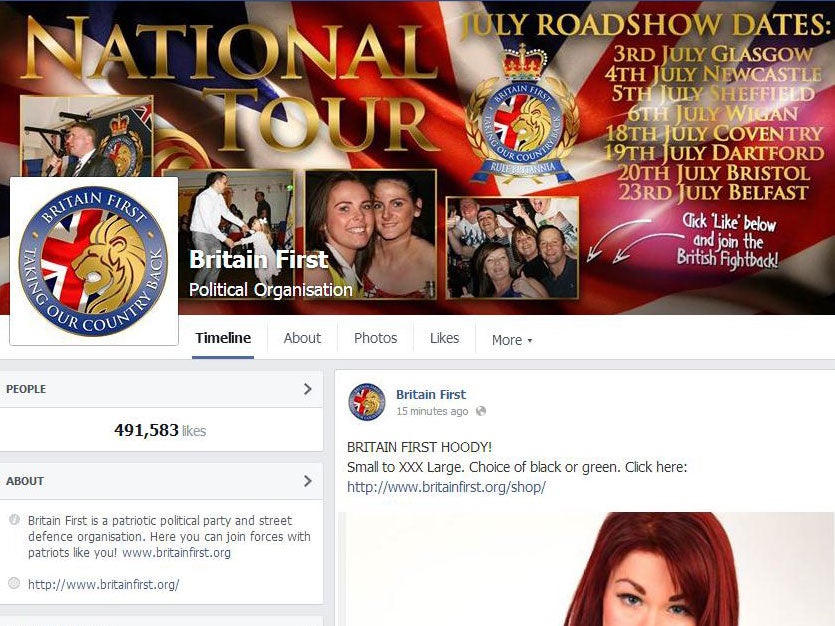Isis, the Rotherham abuse scandal and Lee Rigby killing 'are fuelling far-right extremism'
Far-right groups are utilising social media to recruit new members, a top criminologist has said

Your support helps us to tell the story
From reproductive rights to climate change to Big Tech, The Independent is on the ground when the story is developing. Whether it's investigating the financials of Elon Musk's pro-Trump PAC or producing our latest documentary, 'The A Word', which shines a light on the American women fighting for reproductive rights, we know how important it is to parse out the facts from the messaging.
At such a critical moment in US history, we need reporters on the ground. Your donation allows us to keep sending journalists to speak to both sides of the story.
The Independent is trusted by Americans across the entire political spectrum. And unlike many other quality news outlets, we choose not to lock Americans out of our reporting and analysis with paywalls. We believe quality journalism should be available to everyone, paid for by those who can afford it.
Your support makes all the difference.The activities of Islamic State militants, the Rotherham abuse scandal and the advent of social media are fuelling the growth of Islamophobia from far-right groups in the UK, a leading criminologist has said.
On Thursday, one of the Home Office's most senior advisers on the government’s Prevent strategy told the BBC it was overlooking the issue of far-right extremism as it remained focused on tackling jihadists.
The senior advisor, who wished to remain anonymous, said the government has underestimated the threat the far-right poses to Britain, and warned membership to these groups is on the rise.
He said the UK is experiencing "one of the most worrying periods in right-wing extremism, given the growth in right-wing groups and the recent news events which are making them angrier”.
Imran Awan, a leading criminologist at Birmingham City University, said the support for far-right groups began to surge shortly after the Woolwich killing of Fusilier Lee Rigby.
Mr Awan, who has conducted wide-ranging research into Islamophobia, said the rise was particularly noticeable across social media, which he says far-right movements are utilising to gather momentum and grow rapidly. He believes that to combat this, the government needs to reassess its Prevent strategy in order to tackle extremism from the far-right.
He told The Independent: “There needs to be greater awareness amongst politicians about what Muslims experience from far-right extremism. They need to seek wide-ranging opinions and expertise about how policy can be shaped to tackle these groups.”
He highlighted Britain First and the English Defence League (EDL) as two "techno savvy" groups who are "more sophisticated" with social media, particularly on platforms such as Facebook and Twitter. Both groups, he said, use such platforms to engage with potential members, who tend to be between the ages of 16 and 30-years-old.
“From my research on Islamophobia on twitter, I saw a huge amount of cases where people were very quick to use social media to vent their anger and frustration after events such as the Woolwich killing or Isis beheadings," says Mr Awan.
"With these individuals who send tweets, I can only imagine far-right groups would be happily recruiting them. Many were issuing threats such as attacks on mosques, and Britain First did invade mosques on a few occasions.

"Social media is definitely pushing the growth of these groups. People always assumed far-right groups would continue to appear in the form of demonstrations but I found that actually groups like the EDL are web based organisations who are using Facebook and Twitter to engage and reconnect with audiences."
He described events such as the beheading of two journalists and an aid worker and the abuse scandal, where many of the perpetrators were of Pakistani origin, as a "real recruitment coup" for groups such as the EDL. "You do get more fundamental people who might be on the edge of far-right and seize something like this and use it as a means to whip up more fear and more hysteria," he said.

Mr Awan says he has experienced online abuse himself from social media users because he regularly tweets about issues surrounding Islamophobia. These alleged attacks are coming from individuals as well as far-right groups.
Now, the government should now look to widen its focus from tackling jihadism to also engaging with far-right groups at the grass roots level and creating targeted policy to deal with cyber-abuse.
"We have a lot of legislation where people can be prosecuted but I think the policing of social media itself is very bad. I think the police are no very good at understanding online abuse," he said.
“I do have sympathy that it can be like finding a needle in a virtual haystack, but there needs to be tougher cyber quality control and more effective measurements at monitoring sites where people log in and post, such as forums.
“I think for the government it is easy to try and combat the physical, but the online world has been left to fester and it has been left for the far-right groups to continue to gain power, continue to manipulate and recruit because we have not been taking enough notice of it.”